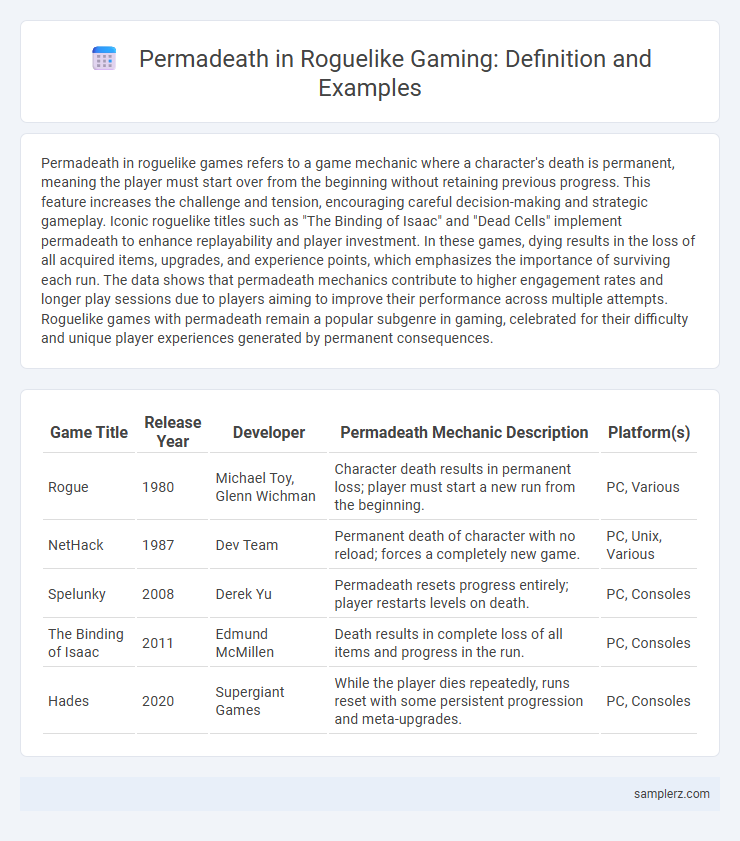Permadeath in roguelike games refers to a game mechanic where a character's death is permanent, meaning the player must start over from the beginning without retaining previous progress. This feature increases the challenge and tension, encouraging careful decision-making and strategic gameplay. Iconic roguelike titles such as "The Binding of Isaac" and "Dead Cells" implement permadeath to enhance replayability and player investment. In these games, dying results in the loss of all acquired items, upgrades, and experience points, which emphasizes the importance of surviving each run. The data shows that permadeath mechanics contribute to higher engagement rates and longer play sessions due to players aiming to improve their performance across multiple attempts. Roguelike games with permadeath remain a popular subgenre in gaming, celebrated for their difficulty and unique player experiences generated by permanent consequences.
Table of Comparison
| Game Title | Release Year | Developer | Permadeath Mechanic Description | Platform(s) |
|---|---|---|---|---|
| Rogue | 1980 | Michael Toy, Glenn Wichman | Character death results in permanent loss; player must start a new run from the beginning. | PC, Various |
| NetHack | 1987 | Dev Team | Permanent death of character with no reload; forces a completely new game. | PC, Unix, Various |
| Spelunky | 2008 | Derek Yu | Permadeath resets progress entirely; player restarts levels on death. | PC, Consoles |
| The Binding of Isaac | 2011 | Edmund McMillen | Death results in complete loss of all items and progress in the run. | PC, Consoles |
| Hades | 2020 | Supergiant Games | While the player dies repeatedly, runs reset with some persistent progression and meta-upgrades. | PC, Consoles |
Classic Roguelikes: Permadeath in Rogue and NetHack
Classic roguelikes like Rogue and NetHack implement permadeath by permanently deleting a character upon death, forcing players to restart from the beginning. This mechanic enhances the tension and strategic depth, as every decision can lead to irreversible consequences in dungeon exploration. The unforgiving nature of permadeath in these games defines the core challenge and replayability of the roguelike genre.
Modern Takes: Permadeath in Dead Cells
Dead Cells redefines permadeath by blending fast-paced combat with procedurally generated levels, forcing players to adapt and strategize anew after every death. Instead of permanent loss of progress, players retain certain unlocked skills and currencies, creating a balanced challenge that promotes experimentation and replayability. This modern approach preserves the high stakes of traditional roguelikes while enhancing player engagement through continual progression.
The Binding of Isaac: Starting Over With Each Death
The Binding of Isaac exemplifies permadeath in roguelike games by resetting the player's progress upon each character's death, forcing a fresh start with new random level layouts and items. This mechanic enhances replayability and strategic depth by requiring players to adapt to unpredictable challenges every run. Persistent unlockables provide long-term progression despite the permanent consequences of death.
Spelunky: Risk and Reward Under Permadeath
Spelunky exemplifies permadeath in roguelike games by resetting player progress upon death, heightening stakes and promoting strategic risk management. Each run in Spelunky demands careful resource allocation and exploration to maximize survival chances, while the permanent loss of items intensifies tension and rewards skillful gameplay. This design choice reinforces the core roguelike challenge, blending unpredictability and player decision-making into a compelling risk-reward dynamic.
Enter the Gungeon: Learning Through Loss
Enter the Gungeon exemplifies permadeath by resetting player progress upon death, emphasizing skill mastery and strategic planning in its procedurally generated dungeons. Each run presents unique weapon upgrades and enemy patterns, encouraging players to adapt quickly and learn from prior failures. This mechanic enhances replayability and deepens player engagement through high-risk, high-reward gameplay dynamics.
Darkest Dungeon: Consequences of True Permadeath
Darkest Dungeon features permadeath mechanics where character loss is permanent, significantly impacting team composition and strategy. The true permadeath system intensifies tension, forcing players to carefully manage resources and consider the risks of every dungeon expedition. This unforgiving consequence heightens immersion, creating a persistent sense of danger and emotional investment in surviving heroes.
Hades: Evolving Narrative With Each Death
In Hades, permadeath resets the player to the beginning of the Underworld, but each death enriches the evolving narrative through new dialogue and story fragments. This roguelike mechanic deepens player immersion by revealing character development and world-building progressively with every run. The game's design transforms failure into storytelling, making each death a crucial part of the overall experience.
Slay the Spire: Permadeath in Deckbuilding
Slay the Spire features permadeath mechanics that reset all progress upon the character's defeat, reinforcing high-stakes decision-making and strategic planning. This roguelike deckbuilding game integrates card synergy and resource management, making each run unique and challenging. The risk of losing a carefully constructed deck amplifies the tension and replayability, hallmark traits of permadeath in modern roguelikes.
Risk of Rain: Co-op Challenges With Permanent Death
Risk of Rain uniquely implements permadeath by resetting players to the beginning of the game upon death, intensifying the stakes in its roguelike co-op gameplay. Players must strategically manage resources and coordinate with teammates to survive progressively difficult levels filled with randomized enemies and items. This permanent death mechanic enhances replayability and demands continuous adaptation to evolving challenges during cooperative sessions.
Indie Gems: Lesser-Known Roguelikes With Permadeath
Indie gems like "Dead Cells" and "Hades" showcase permadeath mechanics that emphasize strategic gameplay and replayability in roguelikes. Titles such as "Caves of Qud" and "Tangledeep" integrate permadeath to create high-stakes environments where each run requires careful decision-making. These lesser-known roguelikes utilize permadeath to deliver unique narratives and evolving challenges that reward mastery and persistence.

example of permadeath in roguelike Infographic
 samplerz.com
samplerz.com